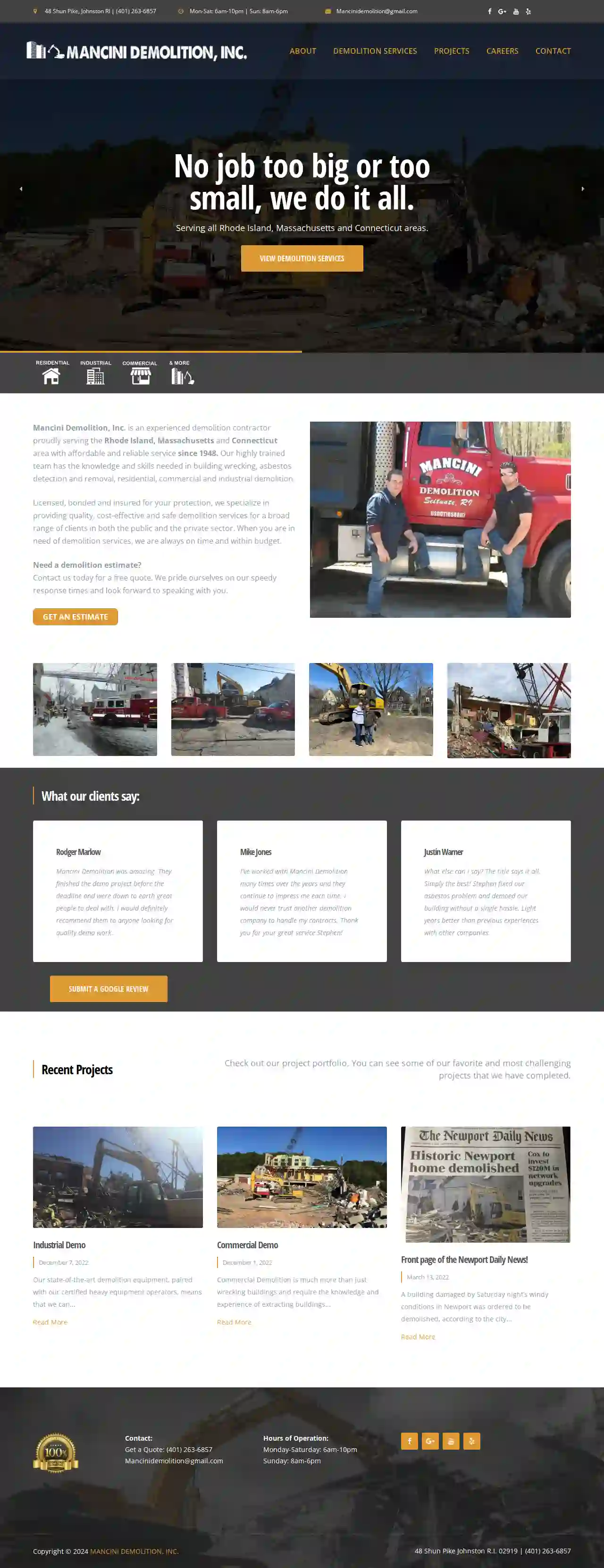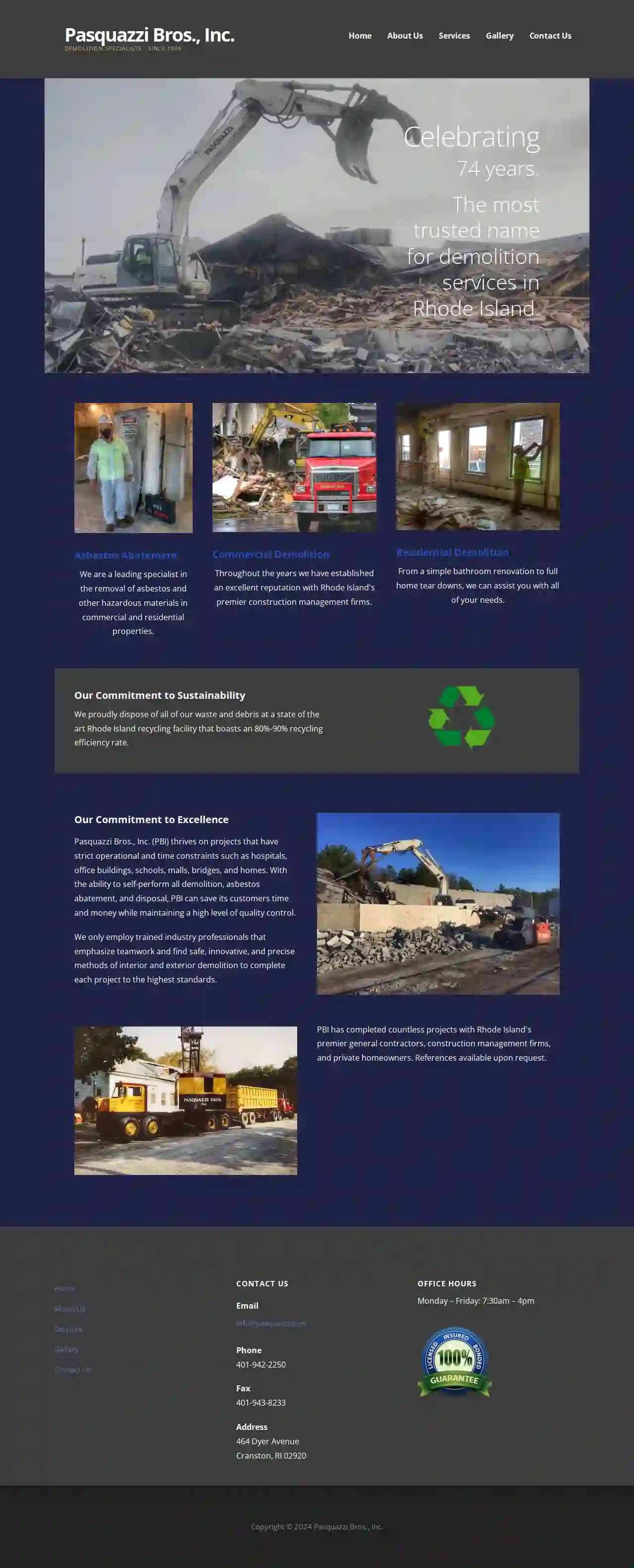Construction Companies Hartford
Find Construction Services in Hartford
Receive multiple Construction Services quotes for your project today! Compare profiles, reviews, accreditations, portfolio, etc... and choose the best service.

Mancini Demolition, Inc.
56 reviews48 Shun Pike, Johnston, 02919, USMancini Demolition, Inc. is an experienced demolition contractor proudly serving the Rhode Island, Massachusetts and Connecticut area with affordable and reliable service since 1948. Our highly trained team has the knowledge and skills needed in building wrecking, asbestos detection and removal, residential, commercial and industrial demolition. Licensed, bonded and insured for your protection, we specialize in providing quality, cost-effective and safe demolition services for a broad range of clients in both the public and the private sector. When you are in need of demolition services, we are always on time and within budget.
- Services
- Why Us?
- Accreditations
- Our Team
- Testimonials
- Gallery
Get Quote
SITECON Corporation
53 reviews1430 Cranston St, Cranston, 02920, USSITECON Corporation is a woman-owned and operated leading environmental remediation and demolition contractor with established clientele and successfully completed projects. Our projects span across Rhode Island, Massachusetts, and Connecticut. As a team of highly experienced and skilled professionals, we are WBE and DBE certified in Rhode Island and Massachusetts as well as maintain memberships in the industry through the USGBC, AGC, RISA, and have LEED AP on staff. We are completely dedicated to safety, quality, efficiency, and dependability on every project for each customer. We are acknowledged expert specialty contractors, with over 60 years of industry experience known for our dedication, and professionalism. As a result of our extensive expertise in the industry, we are continually called upon to advise on some of the region’s largest and most challenging projects.
- Services
- Why Us?
- Accreditations
- Our Team
- Testimonials
- Gallery
Get Quote
National Wrecking Co Inc
4.73 reviews155 N. Wacker Ave., Chicago, 60606, USReliable demolition and dismantling contractor since 1954. We have demolished 120,000+ structures for 2,000+ clients in 36 states. Our unique combination of experience, knowledge, technical expertise, trained personnel, on-site supervision, comprehensive safety measures, and sophisticated equipment has made us the leader in our industry. We provide turn-key operation, whether your project requires design, engineering, environmental, excavation, shoring, earth retention, or demolition services, we can take any building or structure and not only remove it, but leave you a site that is ready to be developed.
- Services
- Why Us?
- Accreditations
- Gallery
Get Quote- Oc
Ocean State Building Wrecking Co Inc
52 reviewsHartford, USOcean State Building Wrecking is a leading provider of demolition and wrecking services in the region. With years of experience and a commitment to safety and quality, we have established ourselves as a trusted partner for homeowners, businesses, and government agencies alike. Our team of experts is dedicated to delivering exceptional results, and we take pride in our ability to handle even the most complex projects with ease.
- Services
- Why Us?
- Gallery
Get Quote 
Pasquazzi Bros., Inc.
51 reviews464 Dyer Avenue, Cranston, 02920, USCelebrating 74 years. The most trusted name for demolition services in Rhode Island. Pasquazzi Bros., Inc. (PBI) thrives on projects that have strict operational and time constraints such as hospitals, office buildings, schools, malls, bridges, and homes. With the ability to self-perform all demolition, asbestos abatement, and disposal, PBI can save its customers time and money while maintaining a high level of quality control. We only employ trained industry professionals that emphasize teamwork and find safe, innovative, and precise methods of interior and exterior demolition to complete each project to the highest standards. PBI has completed countless projects with Rhode Island's premier general contractors, construction management firms, and private homeowners. References available upon request.
- Services
- Why Us?
- Gallery
Get Quote
Over 3,943+ Excavation Companies on our platform
Our excavation pros operate in Hartford & surrounding areas!
ExcavationHQ has curated and vetted Top Excavation Companies in and around Hartford. Find a reliable business today.
Frequently Asked Questions About Construction Companies
- Experience: 'How long have you been in business, and what experience do you have with projects similar to mine?'
- Licensing and Insurance: 'Are you licensed and insured? Can I see proof of your coverage?'
- References: 'Can you provide contact information for past clients?'
- Project Management: 'How will you manage the project timeline and budget? Who will be my point of contact?'
- Communication: 'How will you keep me updated on the project's progress?'
- Warranties: 'What warranties do you offer on your work and materials?'
- Payment Terms: 'What are your payment terms? Do you require a down payment?'
- Change Orders: 'How do you handle change orders if unexpected issues or modifications arise during the project?'
- Residential Construction Companies: Specialize in building, renovating, or remodeling homes.
- Commercial Construction Companies: Focus on constructing commercial buildings such as offices, retail spaces, or industrial facilities.
- Industrial Construction Companies: Specialize in large-scale projects like factories, power plants, or refineries.
- Specialty Construction Companies: Focus on specific trades like roofing, electrical, plumbing, or HVAC.
- General Contractors: Oversee entire construction projects, hiring and managing subcontractors for various trades.
- Experience and Expertise: A proven track record in the type of construction you need (residential, commercial, etc.).
- Proper Licensing and Insurance: Verify their licenses and insurance coverage to protect yourself from liability.
- Positive Reviews and References: Check online reviews and request references from past clients to assess their reputation.
- Clear Communication and Professionalism: Choose a company that communicates effectively, provides detailed proposals, and adheres to ethical practices.
- Financial Stability: Ensure the company has a stable financial history to avoid potential project delays or disruptions.
What questions should I ask a construction company before hiring them?
What are the different types of construction companies?
How do I find a good construction company?
What is pre-construction in a construction project?
What questions should I ask a construction company before hiring them?
- Experience: 'How long have you been in business, and what experience do you have with projects similar to mine?'
- Licensing and Insurance: 'Are you licensed and insured? Can I see proof of your coverage?'
- References: 'Can you provide contact information for past clients?'
- Project Management: 'How will you manage the project timeline and budget? Who will be my point of contact?'
- Communication: 'How will you keep me updated on the project's progress?'
- Warranties: 'What warranties do you offer on your work and materials?'
- Payment Terms: 'What are your payment terms? Do you require a down payment?'
- Change Orders: 'How do you handle change orders if unexpected issues or modifications arise during the project?'
What are the different types of construction companies?
- Residential Construction Companies: Specialize in building, renovating, or remodeling homes.
- Commercial Construction Companies: Focus on constructing commercial buildings such as offices, retail spaces, or industrial facilities.
- Industrial Construction Companies: Specialize in large-scale projects like factories, power plants, or refineries.
- Specialty Construction Companies: Focus on specific trades like roofing, electrical, plumbing, or HVAC.
- General Contractors: Oversee entire construction projects, hiring and managing subcontractors for various trades.
How do I find a good construction company?
- Experience and Expertise: A proven track record in the type of construction you need (residential, commercial, etc.).
- Proper Licensing and Insurance: Verify their licenses and insurance coverage to protect yourself from liability.
- Positive Reviews and References: Check online reviews and request references from past clients to assess their reputation.
- Clear Communication and Professionalism: Choose a company that communicates effectively, provides detailed proposals, and adheres to ethical practices.
- Financial Stability: Ensure the company has a stable financial history to avoid potential project delays or disruptions.